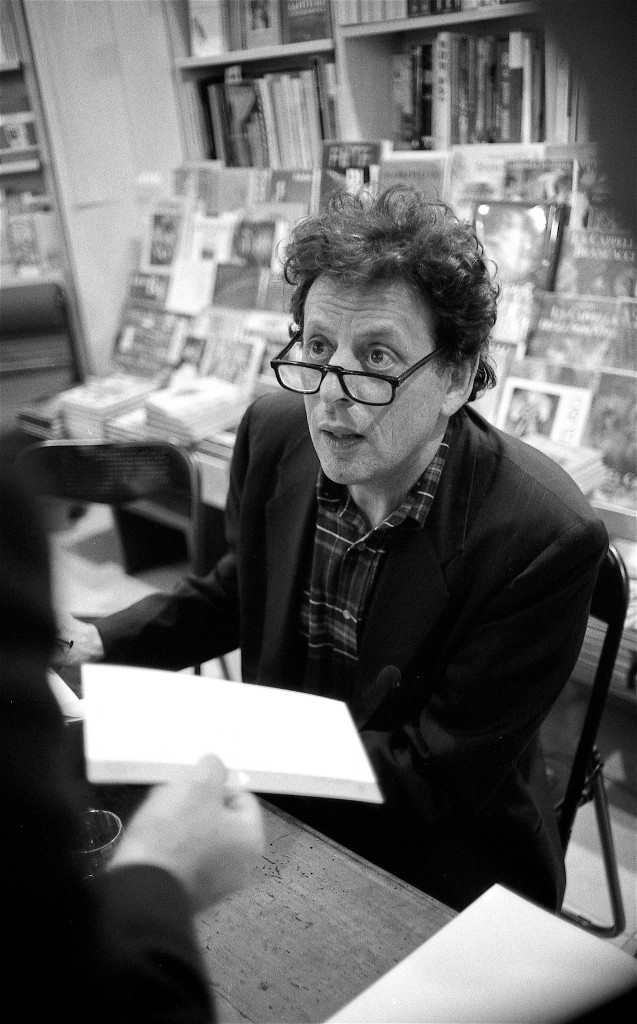 6:14 p.m. Friday, Nov. 6, Keller Auditorium, in the lobby: One hour and 16 minutes to showtime, the show being the West Coast premiere of Philip Glass’s Orphee, by Portland Opera.
6:14 p.m. Friday, Nov. 6, Keller Auditorium, in the lobby: One hour and 16 minutes to showtime, the show being the West Coast premiere of Philip Glass’s Orphee, by Portland Opera.
A crowd’s assembled outside the doors, early birds waiting to claim their spots.
I’m sitting between Byron Beck and Storm Large — rare company.
Time to stop and head for the stage. To be continued. Ha. Nobody’s stopping. Keyboards away!
You’ll find scattered through these posts several Philip Glass Bonus Tracks, outtakes from my Tuesday morning group interview with Glass and from his talk Tuesday night at the Portland Art Museum. They’re interesting, and they fill space nicely when I have nothing to say!
I’m quite looking forward to seeing this — I’ve heard the Paul Barnes solo piano version of some of the music, and I like it. I saw the first of Glass’s Cocteau operas, La Belle et La Bete, on a Halloween night in Eugene — perfect timing. David Stabler and I once went to Eugene to double-team a review of Glass’s A Thousand Airplanes on the Roof, a collaboration with playwright David Henry Hwang. David: Thumbs down. Me: Thumbs up. We had a great time disagreeing. And I remember vividly a solo piano concert by Glass when I realized, he’s a superb pianist, he really knows music history, and he respects the past.
Byron yells: “Cynthia, are you hash-tagging this thing?!” What in god’s name can he be talking about?
Tour time.
We go backstage. It’s a raked stage — one to twelve, as Cynthia Fuhrman says, which means a one-inch drop every foot. Not too bad when you’re standing around, but I wouldn’t want to have to find my mark on it while I was singing. It’s a very chic, uptown Manhattan-style, midcentury modern sort of set. Laura Hassell, the opera’s production manager, points out that there’s a ceiling — not a usual thing — which creates a sense of confinement but also acts as a shell that will help project the sound into the auditorium. It’s a single-set show — originated at Glimmerglass Opera in New York — and most of the action will be downstage. There’s a big mirror that’s crucial to the plot; it has a handprint on it. It’ll be polished shortly before curtain. Because all four performances are being recorded to make a CD of the show, a few small mikes are hidden discreetly around the stage. For the dialogue, mostly.
*****
PHILIP GLASS BONUS TRACK #1
On the appeal of Orphee and the Orpheus myth:
“Life, death, immortality and art. I mean, c’mon. That’s pretty heavy stuff.”
*****
7 p.m.: Friends keep dropping by, saying hi, shaking hands. “Pardon me, is it all right if a take a picture of some of you?” a nicely dressed gentleman asks. “Absolutely,” I reply. “Go ahead.” I suspect he’s going to be aiming at Storm, not me.
“Ladies and gentlemen, the auditorium is now open for seating,” that muffled voice over the microphone announces, but nobody seems to be paying much attention.
This is the lively time: the buzz, the happy rumble, the pre-show pump-up. I love this sound, this bright roar where only a rare word comes through intelligibly, but you can tell everyone’s pumped. This is the lively preamble to a live show, that human factor that only live performance — a play, a dance, an opera, a ballgame — brings out. Communal. I see composer David Schiff standing a few feet away. Love to hear what he has to say afterwards. Mark Mandel, too, who just dropped by. Mark knows more about opera than anyone I know. He should be doing this! Or David Stabler, who just stopped by with his wife Judy.
*****
PHILIP GLASS BONUS TRACK #2
On the parallels between Cocteau’s poet-hero in Orphee and his own life as an artist largely forgotten by the younger generation of artists:
“This film is the autobiographical film. This film is about Cocteau himself.”
*****
7:11 p.m.: I fear this is blather. I’m feeling a bit like Roland Hedley, the fatuous newsman in Doonesbury, who’s just published a book of Twitters. Jim Cox strolls by, dashing in a tux with a silvery Bret Maverick vest. Or is it Bart?
Mighty Toy Cannon is lurking about, mocking my two-finger typing technique. Marc Acito, who’s IN THE CAST, for crying out loud, is behind me hugging Storm. “Shouldn’t you be in makeup?” I ask. “I’m not on until the second act,” he replies.
And now writing guru Mead Hunter is making the rounds. And playwright/filmmaker Jan Baross. And here’s music writer Brett Campbell and his wife.
Oh my god: I’M BECOMING RONA BARRETT!
“I’m Flickering right now, Tweeting, I’m Flickering. I’m having a hard time!” That’s Byron, next to me. Again: What in blue blazes is he talking about?
7:24 p.m.: The opera’s Julia Sheridan comes over. “It’s almost curtain time. Time to wrap up and get to your seats.”
Huzzah!
Photo: Philip Glass in Florence, 1993. Pasquale Salerno/Wikimedia Commons


 What this means is that, while you’re filing into Keller Auditorium before the show, I’ll be in the lobby seated at a table with several other bloggers, dashing out immediate impressions and committing them to cyberspace before I have time to repent and delete. I’ll have a backstage tour beforehand, and yes, I do get to see the show, after which I’ll dash back to my laptop and blog some more. This will be either the rough draft of history or outtakes of an unsifted mind, but I will Not. Look. Back.
What this means is that, while you’re filing into Keller Auditorium before the show, I’ll be in the lobby seated at a table with several other bloggers, dashing out immediate impressions and committing them to cyberspace before I have time to repent and delete. I’ll have a backstage tour beforehand, and yes, I do get to see the show, after which I’ll dash back to my laptop and blog some more. This will be either the rough draft of history or outtakes of an unsifted mind, but I will Not. Look. Back. So when Susan asked whether I’d be a guest performer in Well Arts’ fall show, Voices of Our Elders, I said yes. The process is fascinating. Well Arts people do a 10-week workshop on memoir and creative writing with older people in care centers, listening to their stories, transcribing them, helping them shape them. The result is a show of monologues and a few dialogues from people looking back on their lives, on what was important, and contemplating what’s to come. It’s a fundamental form of personal history and an emotionally involving form of documentary theater.
So when Susan asked whether I’d be a guest performer in Well Arts’ fall show, Voices of Our Elders, I said yes. The process is fascinating. Well Arts people do a 10-week workshop on memoir and creative writing with older people in care centers, listening to their stories, transcribing them, helping them shape them. The result is a show of monologues and a few dialogues from people looking back on their lives, on what was important, and contemplating what’s to come. It’s a fundamental form of personal history and an emotionally involving form of documentary theater. I come home from a few days in the rainylands to the north to discover that it’s been pouring in Portland — not just rain, but bad news.
I come home from a few days in the rainylands to the north to discover that it’s been pouring in Portland — not just rain, but bad news.